Editor:
Brandon Sweet
University Communications
bulletin@uwaterloo.ca
Reflecting on how to prepare tomorrow's sustainability leaders

This article originally appeared on the Faculty of Environment's website.
School of Environment, Resources and Sustainability (SERS) professors Sarah Elizabeth Wolfe and Christine Barbeau are leading a collaborative research program that recently received a $200,000 SSHRC Partnership Development grant to study how fear and awe influence how students learn about and respond to climate change.
“You can’t scare most people into pro-environmental choices,” says Dr. Wolfe, currently a visiting professor at Royal Roads University and the Principal Investigator of the five-project program.
Wolfe developed the program, The Affective Load of Sustainability Education: The implications of emotion for students' engagement and knowledge retention, to extend her earlier Social Sciences and Humanities Research Council of Canada research using Terror Management Theory as part of her Society, Environment and Emotions Lab (SEE-Lab).
Along with Dr. Mickie Noble, associate professor in the School of Environment and Sustainability at Royal Roads, the team is led by the University of Waterloo and includes water faculty members from the University of Victoria’s Civil Engineering department.
“This cross-university project is an excellent opportunity to reflect, as academics, how we can offer courses and teaching that prepares our students for becoming tomorrow’s sustainability leaders,” says Simon Courtenay, director of the School of Environment, Resources and Sustainability at the University of Waterloo. “Dr. Wolfe and her collaborators are opening a new avenue in how we collect empirical evidence to inform our pedagogy.”
With Wolfe's expertise in water, the project will draw from the University of Waterloo's bench strength in sustainability teaching and research. Wolfe works closely with The Water Institute, which is home to 150 faculty members and 300 graduate students from all six Waterloo faculties, who are breaking boundaries in water research by providing a forum for interdisciplinary research and education, including Students of the Water Institute Graduate Section (SWIGS).
Good science
The idea for the research program emerged from Wolfe’s decade of teaching interdisciplinary environmental studies at the University of Waterloo and the past seven years researching emotion and water-related decisions.
“Good science is unquestionably a necessary ingredient in our solutions to environmental problems, but scientific knowledge is never enough by itself,” says Wolfe.
“Science can help grasp the global scale of problems such as climate change, biodiversity loss, and fresh-water scarcity, but potential solutions are also deeply intertwined with psychological, cultural, economic, and political factors that operate mainly at the level of individuals, communities, and societies,” she says.
Wolfe says, in education, it is often assumed that more scientific knowledge will lead to more rational personal behaviour and public policies, as well as better environmental outcomes.
“However, what that curricula are missing are the powerful tools to create the necessary spiritual and cultural transformation that will support pro-environmental behaviours and decisions at all scales and over time,” she adds.
“As a researcher, environmentalist, citizen and parent, I know that we cannot lessen peoples’ fear by highlighting doomsday scenarios, nor by minimizing or rationalizing environmental or water problems. Instead, we need something more powerful than fear. In my role as a professor, I decided to apply these scholarly insights and research findings to the structure, content, and delivery of interdisciplinary environmental education.”
Fear factor
Wolfe quoted Dr. Gus Speth, an American environmental lawyer and advocate, in the grant application.
“I used to think the top environmental problems were biodiversity loss, ecosystem collapse and climate change,” Speth wrote.
“I thought that with 30 years of good science we could address those problems. But I was wrong. The top environmental problems are selfishness, greed and apathy. And to deal with those, we need a spiritual and cultural transformation – and we scientists don’t know how to do that.”
The research team will examine how the rationality assumption constrains post-secondary capacity to generate spiritual, cultural, social, and environmental transformations necessary to tackle climate change.
“We start from the premise that emotions underpin decisions and that learning about environmental problems is qualitatively distinct from feeling that one can do something meaningful and positive to address those problems,” says Barbeau, a co-investigator from the University of Waterloo.
The goal of the program is to develop new cross-institutional approaches, as well as recommendations for further research.
“The projects’ findings will have implications far beyond Canada,” Wolfe says. “As North American and international researchers try to grasp how emotion influences environmental awareness and citizen action and engagement, our research findings will help universities and instructors improve their interdisciplinary environmental programs, with implications not just for these young adults’ well-being but also for their future contributions to society and the planet.”
One hundred percent of the grant’s budget is designated to support four masters and one doctoral student in completing five interrelated research projects over three years. Recruitment of graduate students will begin in the fall with project descriptions posted via Twitter and on the SEE Lab site.
Advancing energy storage systems

By Carol Truemner. This article originally appeared on Waterloo News.
Funding from a prestigious Canadian scholarship will help a new chemical engineering doctoral student improve the performance and lifespan of lithium-ion batteries.

Manh-Kien Tran will receive $50,000 annually for the next three years from the Vanier Canada Graduate Scholarship to further develop his research focused on building a smart cloud-based battery management system.
“I believe that advancements in energy storage systems will pave the way to a safer, cleaner, and more energy-efficient society,” says Tran.
As a recipient of a Vanier scholarship, Tran is motivated to reach his full potential as a researcher.
”I feel that I have a greater responsibility to contribute to my research field as well as my community," he says.
Vanier scholar Manh-Kien Tran
Tran, who earned both his undergraduate and master’s degrees in chemical engineering at Waterloo, served as the controls and system modeling and simulation team lead for the University of Waterloo Alternative Fuels Team (UWAFT) for over a year.
Third Waterloo Engineering degree
He chose to stay at the University for his doctorate because of its “world-class research facilities, knowledgeable and reputable advisors, and amazing community.”
After completing his PhD, he plans to pursue a post-doctoral fellowship to further his research in smart monitoring systems and then continue on with a career in academia.
Tran was one of three across campus to be awarded a Vanier Canada Graduate Scholarship this year.
The federal government launched the scholarship program in 2008 to strengthen the country’s ability to attract and retain world-class doctoral students and establish Canada as a global centre of excellence in research and higher learning.
Centre for Teaching Excellence presents new Faculty Teaching Days
A message from the Centre for Teaching Excellence (CTE).
The Centre for Teaching Excellence will be hosting our annual New Faculty Teaching Days starting on Monday, August 9 and concluding on Tuesday, August 17, 2021. This event is intended for all new faculty who have arrived since September 1st of last year (2020) as well as any new faculty who were unable to attend our sessions last year or are new to their current teaching assignment.
These days in August allow instructors to complete a series of workshops. This year’s sessions will start by focusing on our students in Who Are Our Learners? (Monday, August 9 from 1:30 p.m. to 3:00 p.m.), followed by iBlend (Blended Course Design) short course (synchronous meetings will occur on Tuesday, August 10 from 1:30 p.m. to 3:00 p.m. and Tuesday, August 17 from 1:30 p.m. to 3:00 p.m.) and a session on Copyright, Library Services and Academic Integrity on the second-last day (Monday, August 16 from 1:30 p.m. to 3:00 p.m.)
For more information, please contact Monica Vesely.
Link of the day
Ron Popeil, Infomercial icon, dead at 86
When and Where to get support
Students can visit the Student Success Office online for supports including academic development, international student resources, leadership development, exchange and study abroad, and opportunities to get involved.
Instructors can visit the Keep Learning website to get support on adapting their teaching and learning plans for an online environment.
Course templates are available within your course in LEARN to help you build and edit your content and assignment pages quickly.
The following workshops, webinars, and events are offered by the KL team (CTE, CEL, ITMS, LIB):
- Independent Remote Course Design Essentials, self-directed, continuous self-enrollment course in LEARN.
- Independent Blended Course Design (iBlend), self-directed, ongoing
- New Faculty Teaching Days, Monday, August 9 to Tuesday, August 17
- Waterloo Virtual Reality/Augmented Reality (VR/AR) Community of Practice: An overview of XR initiatives at Georgian College (CTE 7511), Friday, August 20, 12:00 noon to 1:00 p.m.
Employees can access resources to help them work remotely, including managing University records and privacy of personal information. Here are some tips for staying healthy while working from home.
Stay informed about COVID cases on campus by consulting the COVID case tracker.
The Writing and Communication Centre has virtual services and programs to help undergrads, grad students, postdocs and faculty members with academic writing.
- Meet with writing advisors in one-to-one appointments to brainstorm, draft, revise, and polish. No time for an appointment? Try email tutoring for undergrads.
- Beat isolation and make writing progress at weekly Virtual Writing Cafés for grad students and faculty or PJ-Friendly Writing Groups for Undergrads.
- Take an online workshop or apply to our popular Dissertation Boot Camp program.
- Faculty can request custom in-class workshops for their courses, or the WCC can facilitate any existing workshops for student groups.
Co-op students can get help finding a job and find supports to successfully work remotely, develop new skills, access wellness and career information, and contact a co-op or career advisor.
The Centre for Career Action assists undergraduates, graduate students, postdocs, staff, faculty, and alumni through navigating career services that are right for them. You can attend a one-on-one appointment or same day drop-in session at the CCA for assistance with cover letter writing, career planning and much more. You can also book an appointment online or visit our Live Chat to connect with our Client Support Team. The CCA is here to help you.
If you feel overwhelmed or anxious and need to talk to somebody, please contact the University’s Campus Wellness services, either Health Services or Counselling Services. You can also contact the University's Centre for Mental Health Research and Treatment. Good2Talk is a post-secondary student helpline available to all students.
The Library continues to offer virtual access to learning and research materials as well as through their book pickup and delivery services. Davis Centre Library study space is open by appointment Monday to Friday from 9 a.m. to 5 p.m. Special Collections & Archives can also be accessed by appointment. Library staff are available for questions via Ask Us. Full details of current service offerings can be found on their Services Updates page. The Library has also published a resource guide on how to avoid information overload.
The Faculty Association of the University of Waterloo (FAUW) continues to advocate for its members. Check out the FAUW blog for more information.
The University of Waterloo Staff Association (UWSA) continues to advocate for its members. Check out the UWSA blog for more information.
The Sexual Violence Prevention and Response Office (SVPRO) supports all members of the University of Waterloo campus community who have experienced, or been impacted, by sexual violence. This includes all students, staff, faculty and visitors on the main campus, the satellite campuses, and at the affiliated and federated Waterloo Institutes and Colleges. For support, email: svpro@uwaterloo.ca or visit the SVPRO website.
The Indigenous Initiatives Office is a central hub that provides guidance, support, and resources to all Indigenous and non-Indigenous campus community members and oversees the university Indigenization strategy.
The Waterloo Indigenous Student Centre, based at St. Paul’s University College, provides support and resources for Indigenous students, and educational outreach programs for the broader community, including lectures, and events.
WUSA supports for students:
Peer support - MATES, Glow Centre, RAISE, Women’s Centre - Visit https://wusa.ca/peersupport to book an appointment
Bike Centre – Open via Appointments and Rentals
Campus Response Team, ICSN, Off Campus Community and Co-op Connection all available online. Check https://wusa.ca for more details.
Food Support Service food hampers are currently available from the Turnkey Desk on weekdays from 7:30 a.m. to 7:00 p.m. in the Student Life Centre. If you have any questions please email us at foodsupport@wusa.ca.
Centre for Academic Policy Support - CAPS is here to assist Waterloo undergraduates throughout their experience in navigating academic policy in the instances of filing petitions, grievances and appeals. Please contact them at caps@wusa.ca. More information is available.
WUSA Commissioners who can help in a variety of areas that students may be experiencing during this time:
- Equity – equity@wusa.ca
- Co-op and Experiential Affairs – coop.affairs@wusa.ca
WUSA Student Legal Protection Program- Seeking legal counsel can be intimidating, especially if it’s your first time facing a legal issue. The legal assistance helpline provides quick access to legal advice in any area of law, including criminal. Just call 1-833-202-4571.
Empower Me is a confidential mental health and wellness service that connects students with qualified counsellors 24/7. They can be reached at 1-833-628-5589.
When and Where (but mostly when)
Healthy Warriors at Home(Online Fitness)
Fitness Classes (CIF GYM 3). Power Yoga, HIIT and Zumba. Only $4/class. Advanced registration required.
Warriors vs. Laurier Blood Donation Battle. Join your fellow Warriors, donate blood and help us win the Blood Battle against Laurier for a second year in a row. Set up a profile or add the PFL code: UNIV960995 to your account if you have a blood.ca account already. Questions? Contact WarriorsInfo@uwaterloo.ca.
Drop-in to Warrior Virtual Study Halls on Wednesdays from 5:30 p.m. to 7:00 p.m. Come together in this virtual space to set goals and work independently or in groups each week.
Renison English Language Institute continues to offer virtual events and workshops to help students practice their English language skills.
Spring 2021 Wellness Sessions are here. Register for sessions on Building Working Relationships, Self-Care Strategies During COVID-19, and more. To learn more about each workshop being offered this term and how to register, visit uwaterloo.ca/healthy-workplace/spring-2021-wellness-sessions.
NEW - New Faculty Teaching Days, Monday, August 9 to Tuesday, August 17.
CIHR Project Grant Reviewer Panel Session: Learn from grant reviewers about how to give your CIHR project grant application a competitive edge. Wednesday, August 11, 9:30 to 11 a.m. Please register by emailing: UW CIHR team(uwcihr@uwaterloo.ca)